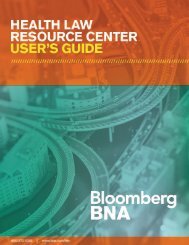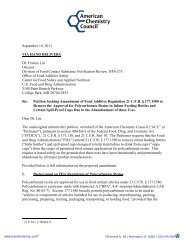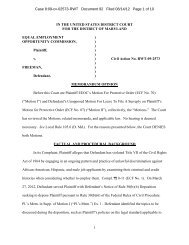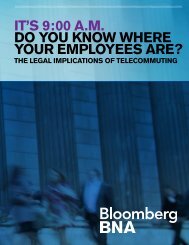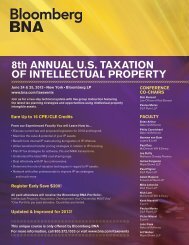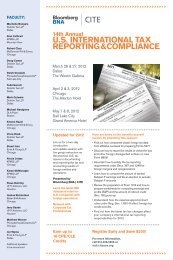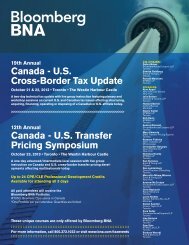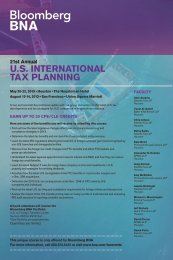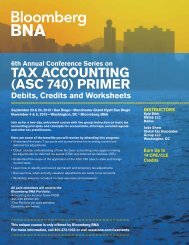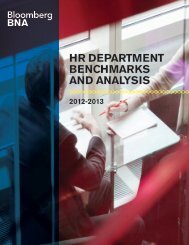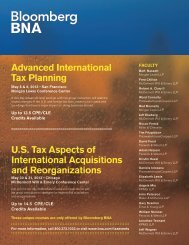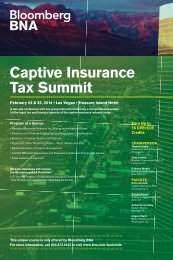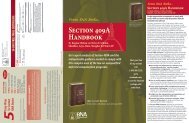BOOKS
LE Catalog - Bloomberg BNA
LE Catalog - Bloomberg BNA
- No tags were found...
You also want an ePaper? Increase the reach of your titles
YUMPU automatically turns print PDFs into web optimized ePapers that Google loves.
LABOR LAW<br />
The Developing Labor Law:<br />
The Board, the Courts, and the<br />
National Labor Relations Act,<br />
Sixth Edition<br />
John E. Higgins, Jr., Editor-in-Chief<br />
(Main Volume); Tanja L. Thompson,<br />
Gwynne A. Wilcox, and Barry J. Kearney,<br />
Editors-in-Chief (2013 Supplement)<br />
Committee on Development of the Law<br />
Under the National Labor Relations Act,<br />
ABA Section of Labor and Employment Law<br />
The ultimate desktop reference for labor and employment<br />
law practitioners<br />
For more than 40 years, practitioners have relied on The Developing Labor<br />
Law: The Board, the Courts, and the National Labor Relations Act<br />
to keep them current on U.S. labor law. This two-volume treatise, written by<br />
distinguished members of the ABA Section of Labor and Employment Law<br />
representing management, labor, and neutrals, is the essential research tool for<br />
labor and employment law practitioners. It provides an authoritative, balanced<br />
perspective on the legal rights and duties of employees, employers, and unions<br />
and on procedures and remedies under the National Labor Relations Act (NLRA).<br />
The Sixth Edition offers updated discussion of a number of important topics,<br />
including:<br />
• Employer-mandated confidentiality agreements<br />
• Employee handbook restrictions on solicitations<br />
• Definition of a supervisor, an independent contractor, and a “salt”<br />
• The disagreement between the Board and the Ninth Circuit<br />
concerning the right of an employer to unilaterally discontinue union<br />
dues checkoff after a contract expires<br />
• Obligation of an employer to provide financial information requested<br />
by the union during bargaining<br />
• Legitimacy of union use of inflated rat balloons and banners to<br />
advertise labor disputes<br />
• Rights of employees to object to payment of full union dues under a<br />
union shop agreement<br />
• Obligation of an employee who is unlawfully discharged under the<br />
NLRA to seek interim employment<br />
Cases discussed in the Sixth Edition concern such topics as:<br />
• Employer restrictions on the use of company email to discuss<br />
union activity<br />
• Standards for determining the unit in which an election should be<br />
held when unions are seeking smaller units than employers<br />
• Whether voluntary recognition bars the filing of an election petition<br />
• Whether union bannering amounts to picketing in violation of the<br />
secondary boycott and recognitional picketing provisions of the NLRA<br />
• The requirement by unions that employees notify them annually<br />
of their objections to paying union dues in excess of the cost of<br />
representing the unit<br />
• The standards for determining whether an employer’s refusal to hire a<br />
“salt” is unlawful<br />
• Qualification of an “at will” employee as a permanent strike<br />
replacement<br />
• Assessment of supervisory status<br />
• Board jurisdiction over operators of charter schools<br />
SUPPLEMENT INFORMATION >>><br />
The 2013 Supplement discusses significant decisions reversing longstanding<br />
NLRB precedent, including WKYC-TV, in which the NLRB reversed 50 years<br />
of precedent and announced that employers may not unilaterally discontinue<br />
dues-checkoff provisions after the expiration of collective bargaining agreements,<br />
and Piedmont Gardens, in which the NLRB reversed 35 years of precedent,<br />
dramatically changing the rule applicable to employers in responding to union<br />
information requests seeking employee witness statements collected during<br />
a workplace investigation. The 2013 Supplement also reviews recent NLRB<br />
social media cases, including Hispanics United of Buffalo, Inc., in which the<br />
NLRB found that an employer violated the Act by firing five employees for<br />
comments they posted on Facebook, and cases in which the NLRB found<br />
employer rules and policies violate Section 7 of the Act and infringe upon<br />
employees’ rights.<br />
––––––––––––––––––––––––––––––––––––––––––––––––––––––––––<br />
“The Developing Labor Law is the most comprehensive resource<br />
in the field—I have been using it ever since it first came out. The new<br />
Sixth Edition offers the latest analysis, and I would recommend it to<br />
anyone working in our field.”<br />
—Gordon E. Krischer, Of Counsel, O’Melveny & Myers LLP, Los Angeles, Calif.<br />
––––––––––––––––––––––––––––––––––––––––––––––––––––––––––<br />
John E. Higgins, Jr., is an adjunct faculty member at the Columbus School of Law, The<br />
Catholic University of America, Washington, D.C., and is retired from the NLRB.<br />
Tanja L. Thompson is a shareholder in the Labor Management Relations practice group<br />
with Littler Mendelson, Memphis, Tenn.<br />
Gwynne A. Wilcox is a partner with Levy Ratner, New York, N.Y.<br />
Barry J. Kearney is the associate general counsel of the Division of Advice at the National<br />
Labor Relations Board in Washington, D.C.<br />
SUMMARY OF CONTENTS<br />
Part I. History of the NLRA<br />
Chapter 1. Historical Background of the Wagner Act<br />
Chapter 2. The Wagner Act Period<br />
Chapter 3. The Taft-Hartley Changes<br />
Chapter 4. The Landrum-Griffin Changes<br />
Chapter 5. The Post–Landrum-Griffin Period<br />
Part II. Protected Employee Activity<br />
Chapter 6. Interference With Protected Rights<br />
Chapter 7. Discrimination in Employment<br />
Chapter 8. Employer Domination of and Assistance to Labor Organizations<br />
Part III. The Representation Process and Union Recognition<br />
Chapter 9. Restrictions on Preelection Activity: “Laboratory Conditions”<br />
Chapter 10. Representation Proceedings and Elections<br />
Chapter 11. Appropriate Bargaining Units<br />
Chapter 12. Recognition and Withdrawal of Recognition Without an Election<br />
Part IV. Collective Bargaining Process<br />
Chapter 13. The Duty to Bargain<br />
Chapter 14. Effect of Change in Bargaining Representative During the Term of a<br />
Collective Bargaining Agreement<br />
Chapter 15. Effect of Change in the Employing Unit: Successorship<br />
Chapter 16. Subjects of Bargaining<br />
Part V. Arbitration and the Act<br />
Chapter 17. Relation of Board Action to Enforcement of Agreements Under Section 301<br />
Chapter 18. Accommodation of Board Action to the Arbitration Process<br />
Part VI. Economic Action<br />
Chapter 19. The Primary Strike<br />
Chapter 20. The Lockout<br />
Chapter 21. Picketing for Organization and Recognition<br />
Chapter 22. Secondary Activity: Handbills, Pickets, and Strikes<br />
Chapter 23. Section 8(e): The “Hot-Cargo” Agreement<br />
Chapter 24. Jurisdictional Disputes and “Featherbedding”<br />
Part VII. Relations Between Employee and Union<br />
Chapter 25. The Duty of Fair Representation<br />
Chapter 26. Union Security<br />
Part VIII. Administration of the Act<br />
Chapter 27. Jurisdiction: Coverage of the Act<br />
Chapter 28. Federal Preemption of State Regulation<br />
Chapter 29. Accommodations to Other Federal Enactments<br />
Chapter 30. RICO and Labor Law<br />
Chapter 31. NLRB Procedures<br />
Chapter 32. NLRB Orders and Remedies<br />
Chapter 33. Judicial Review and Enforcement<br />
Appendix: National Labor Relations Act<br />
Table of Cases<br />
Index<br />
2012/2 Volumes/3,582 pp. Hardcover with 2013 Supplement<br />
Order #9280P/$710.00<br />
2013 Supplement alone/ISBN 978-1-61746-280-1<br />
Order #2280/$210.00<br />
See Bundled Order #8183, 8443, 8480, 8493, 8690, and 8799 on order form for best value.<br />
New Cumulative Supplement Due Winter 2014.<br />
www.bna.com/bnabooks/dll<br />
20<br />
www.bna.com/bnabooks



